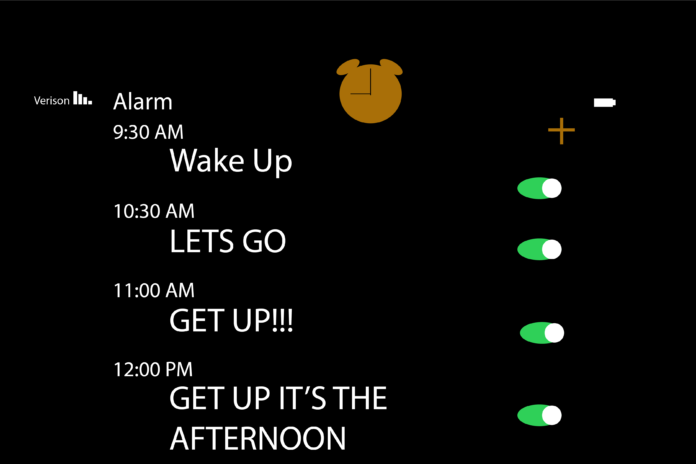How remote learning complicates natural sleep habits
In this unprecedented time, abnormal is the new normal. Now that the whole world is out of whack, it’s only fair that we contribute to the chaos via our sleep schedules. We have surrendered to the powerful nature of sleep — so much so that we’ve become bear-like in habit. UC Davis students discussed how their sleep habits have changed since the pandemic.
Alexander Markosian, a junior transfer and sustainable agriculture and food services major, is “definitely not a natural morning person.” What first motivated Markosian’s switch to a morning routine was the amount of screen time required for this new virtual way of life. He said this new routine is “healthier, but for the wrong reasons.”
The visual strain of increased screen time has taken its toll on Markosian. Now that school is remote, he finds himself using technology more than usual. As a result, eye strain and headaches occur, leaving him exhausted and ready for bed at an earlier time.
“I’m not staying up at night scrolling on my phone because I’ve already done that during the day,” Markosian said.
Although his sleep schedule improved, it comes at the cost of increased screen time, or rather, the negative effects of it.
According to recent studies, the blue light emitted by screens obstructs a good night’s sleep and leaves remnants of the night’s exhaustion into the next morning in the form of grogginess.
The light disrupts our body’s biological clock — that is, our circadian rhythms that transmit messages that prompt us when to sleep and when to wake up. Data reveals that the blue light, specifically, makes us less tired and more alert through the nighttime — making it harder to get the sleep we need.
It is recommended to set screens aside for two hours before heading to bed. That way, the body has time to readjust to its natural clock away from the artificial blue light that prevents our bodies from rest.
In addition, amid remote learning, study spaces have been compromised. Beds are now utilized as a sleep, television and study area all in one. As a result, beds have become a metropolitan of all our daily activities — convoluting work with rest.
Markosian said he avoids doing schoolwork in his bed. By natural association of bed and sleep, he likes to “keep those realms separate.”
Evidence of recent studies reveals that one should not study in bed to avoid cross-contamination of sleep and study habits. The choice of pressing “snooze” in the bed will inevitably lead to pressing “snooze” in your work habits — subconsciously promoting laziness in work.
“If I start working in my bed, I start sleeping,” Markosian said. By avoiding his bed while studying, he chooses to not “mix business with pleasure.”
Prior to social distancing, Markosian would go to bed around midnight and wake up around 10 a.m. Now that he is going to bed earlier, he wakes up earlier as well. As a result, he has established a morning routine of yoga and meditation to start off his day.
“I feel like my mornings aren’t being wasted, there’s more time to be productive,” he said, adding that he hopes to continue this new sleep schedule once shelter-in-place orders are lifted.
According to Oscar Hood, a second-year economics major, treating social distancing “as a blessing in disguise” keeps him grounded amid the pandemic.
Although Hood admitted that his sleep schedule is now “pretty messed up,” he has been harnessing his hours awake “100%” for his music — practicing and recording until the wee hours of the morning.
Jam sessions at 3 a.m. may not be ideal for many, but for Hood, his “circadian rhythm is naturally tuned” to the night. Since quarantine began, Hood has been “insanely productive” with pastimes he wouldn’t normally have time to pursue.
“I’m actually kind of thriving,” Hood said. Although this is an unprecedented time with many alterations to normalcy, Hood’s methodology of maintaining sanity is by approaching it with a glass half full mentality.
Not everyone is as optimistic as Hood, however. Some are using the extra time as an opportunity to catch up on some sleep — arguably, a little too much.
“I’m just oversleeping and not doing anything,” said Brooke Henderson, a fourth-year human development major. “Now it’s just a habit, and I feel like I have to get so much sleep. I’m more tired than I normally am during the school year.”
Some habits die hard. Henderson admitted that her sleep schedule was healthier prior to shelter-in-place orders. Although she still goes to bed around midnight, she now sleeps in until about noon. Without the routine schedule of normalcy prior to COVID-19, Henderson has little motivation to simply get out of bed in the morning.
“I’m just sleeping out of boredom, I guess,” Henderson said.
Henderson’s sleep schedule now includes more naps. She admitted that although she aims for a twenty-minute cat nap, it realistically ends up being one to two hours long.
Henderson was a morning person before the pandemic, but now she doesn’t know what she is — she’s “just asleep.”
She is optimistic that her sleep schedule will gradually improve once shelter-in-place orders are lifted — once there is “more motivation to switch back to old habits.”
Under the circumstances, Henderson empathizes with those suffering the distortion of prior normalcy.
“This is just so unnatural for humans,” she said. “I feel like no one should be that hard on themselves for getting too much sleep or not being productive. We’re all doing the best we can right now in this very unprecedented time.”
Sleep schedules have been altered, there’s no denying that. Whether taking this time to hibernate or hone in on your craft, everyone is learning as they go — even if it is by hitting the snooze button one too many times.
Written by: Sierra Jimenez — arts@theaggie.org




